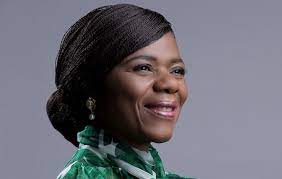click to dowload our latest edition
CLICK HERE TO SUBSCRIBE TO OUR NEWSLETTER


Published
3 years agoon
By
Steven Gruzd“We are becoming George Orwell’s Animal Farm in South Africa, where some animals are more equal than others. People think they are above the law. We must nip this in the bud. Orwell said, ‘In a time of deceit, telling the truth is a revolutionary act.’”
These were the words of South Africa’s fearless former public protector, Professor Thuli Madonsela. She was delivering the annual Nadine Gordimer Lecture at the University of the Witwatersrand (Wits) on 5 May 2021 via Zoom. Her theme was, “The audacity to speak an inconvenient truth”. The lecture, celebrating the life, work, and values of Gordimer, who was awarded the Nobel Prize in Literature in 1991, was first held from 2004 to 2006. It was revived in 2017 by the Friends of Nadine Gordimer Committee and the Wits School of Literature, Language, and Media.
Madonsela said of the writer, who was a child of Jewish immigrants to South Africa, “I admired and was inspired by Nadine Gordimer since my student days. She transcended justice as more than ‘just us’. Her literature questioned the order of the day. It moved the needle with regard to justice, especially in South Africa, for black people in their different shades.”
“Nadine was of Jewish descent in a country where whiteness was everything,” said Madonsela. “She was Jewish and white, but she chose to concern herself with the most underprivileged.”
Gordimer’s writing deals with themes of alienation, exile, and personal transformation, and how lives were affected by apartheid. “She understood being privileged in a society anchored in underprivilege … she used her words to shift consciousness in society. She shed light on inconvenient truths … she held a torch, small but powerful, to dispel darkness,” Madonsela said.
“When you speak an inconvenient truth, you face the consequences. You may be ostracised for delivering it,” she said. She mentioned the bravery of the late MP, Ben Turok, also the child of Jewish immigrants, who spoke out about the excesses of his political party, the African National Congress.
Madonsela said that corruption among public leaders and in the private sector was among the biggest inconvenient truths of our time. “Saving democracy should be at the forefront; defending the rule of law and integrity in state affairs. Corruption must be hit with the full force of the law. If there ever was a poison, it’s corruption, on justice, social justice, and social cohesion.” But she warned that we can’t win the war on corruption and state capture if it’s divorced from social justice.
Nelson Mandela hadn’t considered treating the multiple institutions for accountability “as an irritation”, Madonsela said. “We need to save democracy, beyond getting Jacob Zuma to obey the law. How do we handle COVID-19, and not grow into an authoritarian state?
“An inconvenient truth is that we should expose corruption by anyone, including people who are our friends. In Nkandla and state capture, I had to question people who considered themselves ‘my people’. In the name of remedial and restitutive measures, we have condoned nepotism, political cronyism, and exacerbated polarisation in society.”
In Gordimer’s time, the challenge was social justice, with groups excluded from opportunities and resources. “What’s our inconvenient truth? For me it’s finding sufficient consensus on what we regard as social justice. Some believe that we are all equal now, we should leave the past in the past, and treat everyone the same in an antidiscrimination regime. But this cements unequal power relations. We shouldn’t assume that all are equal – decades of systemic racial discrimination needs positive measures, it needs commitment to overcome that.”
Madonsela pointed out that the way black economic empowerment had been implemented “wasn’t right and a lost cause. It was an assimilationist move, where blacks were absorbed into historically white institutions. But the model was wrong – money went into buying shares.” BEE had also “been corrosive to black and white small business … BEE is bizarre for family-owned businesses – to artificially have black partners. BEE has enforced white supremacy instead of undermining it.
“Words hurt, sometimes worse than swords,” Madonsela said. “Words can divide and destroy. There would have been no Rwandan genocide without words, no Holocaust. Where do we draw the line in protecting people from hate speech, but not curbing free speech?”
Finally, she asserted that the news media could be regressive or progressive. “The media did an excellent job in exposing apartheid, global injustice, state capture – look at WikiLeaks and GuptaLeaks. They have been amazing. Without them, I couldn’t have done my job as public protector, leading to where the truth was hiding. But we have to realise and recognise our own prejudices and biases … we are wired to discriminate.”
